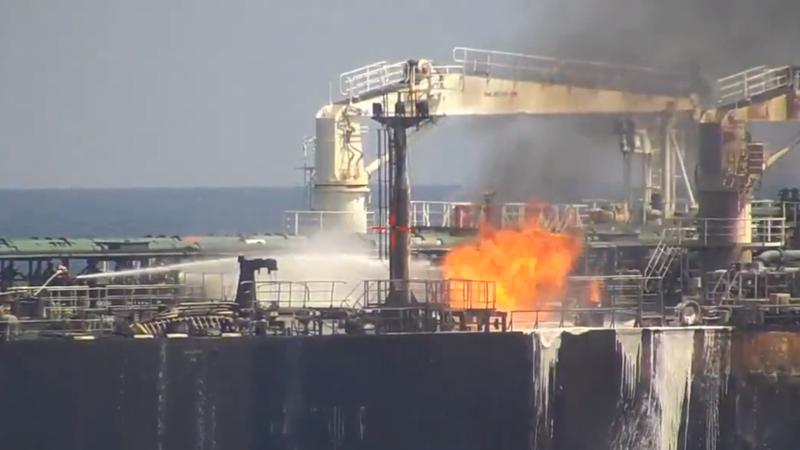Published 10:58 IST, January 28th 2024
India is Emerging Power, Not China: World Lauds Navy’s Daring Rescue Op in Red Sea
INS Visakhapatnam's daring Red Sea rescue reshaped global perceptions, positioning India as a formidable naval force.

New Delhi: INS Visakhapatnam, a guided-missile destroyer of the Indian Navy, played a crucial role in rescuing the crew of the Marshall Islands-flagged oil tanker MV Marlin Luanda in the Red Sea, comprising 22 Indians and one Bangladeshi. Following the incident and India’s contribution to mitigate the situation, the West and the globe has been fascinated, leading them to assert that India is the emerging power, not China.
“The Indian Navy - clearly a critical player, providing vital support to security in the region”, said Damien Symon a leading Open Source Intelligence (OSINT) expert.
Houthi Missile Attack: Escalation in the Red Sea Crisis
The merchant vessel faced a missile attack allegedly carried out by Iran-backed Houthis, raising concerns about security in the Red Sea and the Gulf of Aden. After receiving a distress call from MV Marlin Luanda, INS Visakhapatnam responded to provide assistance. Indian Navy spokesperson Commander Vivek Madhwal reported that the naval firefighting team, consisting of 10 personnel equipped with specialist firefighting gear, successfully brought the blaze under control after six hours of intense efforts.
The vessel, owned by UK-based Oceonix Services and operated by Singapore-based Trafigura, had become a target of Houthi attacks, possibly in response to Israel's military actions in Gaza. The situation escalated, prompting a coordinated response from the Indian, US, and French Navies. Following the operation, the US Central Command thanked the Indian Navy for their assistance.
“Thanks to this rapid response by the U.S., Indian, and French navies, the fire is now extinguished. There were no casualties in the attack; the ship remains seaworthy and has returned to its previous course. Many thanks to our Combined Maritime Forces partners for their great teamwork at sea, averting a disaster that threatened lives and the seaworthiness of the ship and risked major environmental damage,” said the Centcom in their official statement.
West in Awe of India’s Growing Naval Prowess
Not only Centcom but the West is now in awe of India’s growing maritime capabilities and its increased presence in the Gulf of Aden. “India takes over. Superpower rising... Stop drooling over China,” said Martin Sauerbrey, a researcher at LBI for the Consequences of War, following India’s successful rescue operation. Another senior journalist, Mark Urban, added, “Among the emerging great powers, it is fascinating to see how India has risen to the crisis in the Gulf of Aden and Red Sea... China not so much.”
Operational Details: INS Visakhapatnam's Swift and Effective Response
Commander Madhwal stated that the Navy is committed to ensuring the safety of merchant shipping and seafarers. He mentioned that the naval team would continue monitoring the situation to prevent any potential re-ignition of the fire. The flames were doused after a 6-hour-long battle, and it was the Indian naval firefighting team that made it possible.
Providing details about the incident, the Navy spokesperson stated, "Based on a request from MV Marlin Luanda, INS Visakhapatnam has deployed its NBCD (nuclear biological chemical defence and damage control) team along with firefighting equipment to render assistance to the crew towards augmenting firefighting efforts on board the distressed MV."

The incident, as per CentCom, Houthis reportedly fired an anti-ship ballistic missile from their controlled areas of Yemen, hitting the oil tanker on January 26. The distressed vessel issued a distress call, prompting the timely response from INS Visakhapatnam, USS Carney, and other coalition ships.
In previous instances, the Navy successfully prevented the hijacking of the Liberian-flagged vessel MV Lila Norfolk in the North Arabian Sea and responded to a drone attack on the Liberian-flagged vessel MV Chem Pluto off India's west coast.
As a measure, the Indian Navy has increased the deployment of its frontline ships and surveillance aircraft to enhance maritime security operations in critical sea lanes, particularly in the North and Central Arabian Sea. These efforts reflect the Navy's commitment to safeguarding the well-being of seafarers and ensuring the security of maritime activities in the region.
Updated 13:16 IST, January 28th 2024




